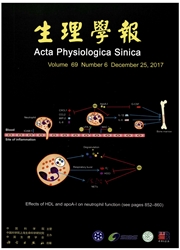

 中文摘要:
中文摘要:
水通道蛋白-4(aquaporin-4,AQP-4)作为水通道蛋白家族之一,在中枢神经系统具有广泛的分布,且在星形胶质细胞终足上高表达。研究表明,AQP-4可通过调节星形胶质细胞的功能在维持脑内水稳态、脑体积和神经元兴奋性等方面发挥重要的作用。但是AQP-4在突触可塑性、学习记忆及认知等方面所发挥的作用还不明了。突触功能可塑性的变化按其性质的不同可分为长时程增强(long term potentiation,LTP)和长时程抑制(long term depression,LTD),两者被公认为是学习记忆的神经生物学基础。海马区是调节学习记忆过程的核心脑区,其突触可塑性与学习记忆有密切的关系。本文旨在综述AQP-4与海马区突触可塑性及相关学习记忆的关系研究进展,并展望AQP-4作为新的靶点在认知功能障碍中的可能作用,为临床治疗相关神经系统疾病提供新的思路与方向。
 英文摘要:
英文摘要:
Aquaporin-4 (AQP-4) is the predominant water channel in the central nervous system (CNS) and primarily expressed in astrocytes. Astrocytes have been generally believed to play important roles in regulating synaptic plasticity and information process- ing. However, the role of AQP-4 in regulating synaptic plasticity, learning and memory, cognitive function is only beginning to be investigated. It is well known that synaptic plasticity is the prime candidate for mediating of learning and memory. Long term potenti- ation (LTP) and long term depression (LTD) are two forms of synaptic plasticity, and they share some but not all the properties and mechanisms. Hippocampus is a part of limbic system that is particularly important in regulation of learning and memory. This article is to review some research progresses of the function of AQP-4 in synaptic plasticity, learning and memory, and propose the possible role of AQP-4 as a new target in the treatment of cognitive dysfunction.
 同期刊论文项目
同期刊论文项目
 同项目期刊论文
同项目期刊论文
 期刊信息
期刊信息
